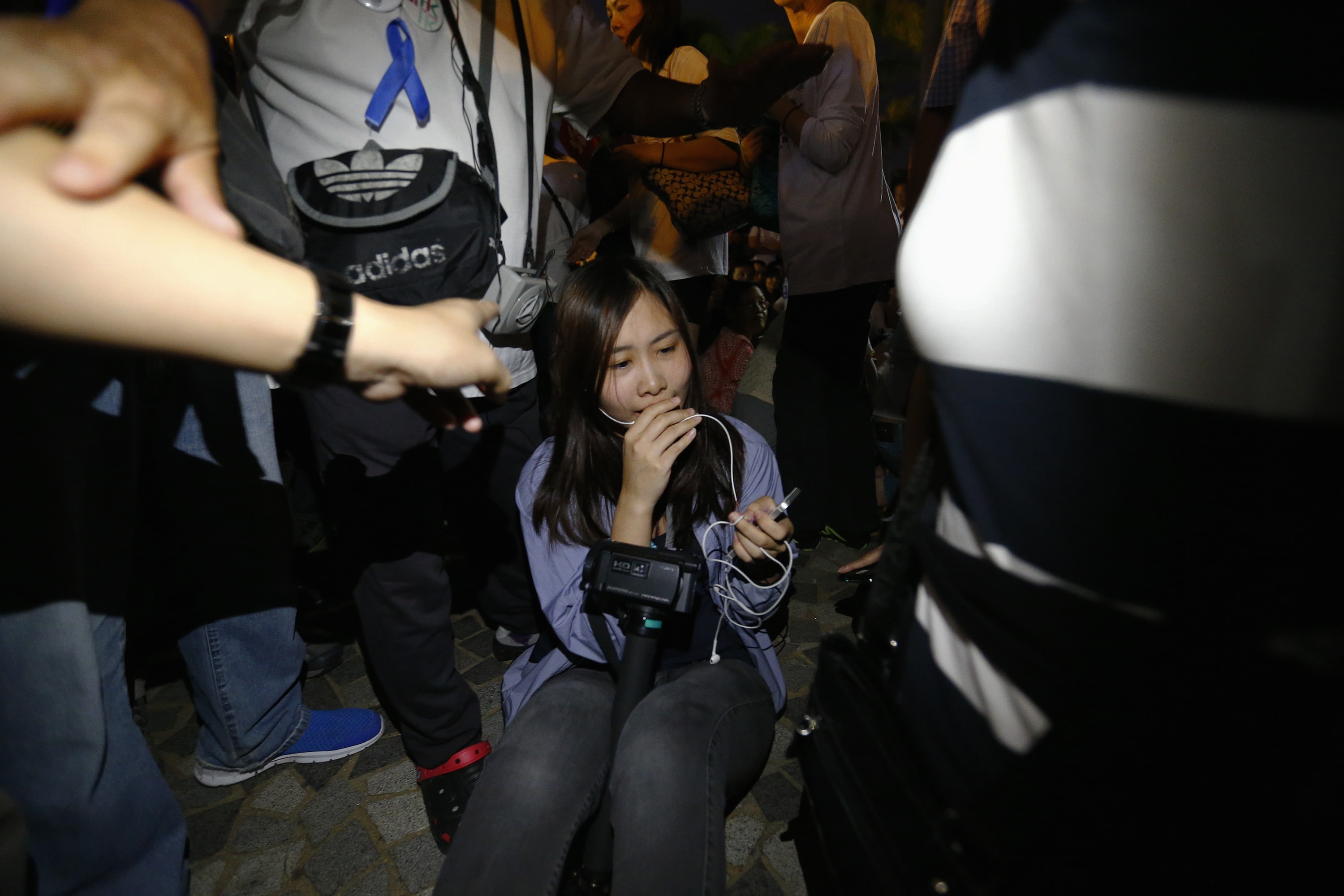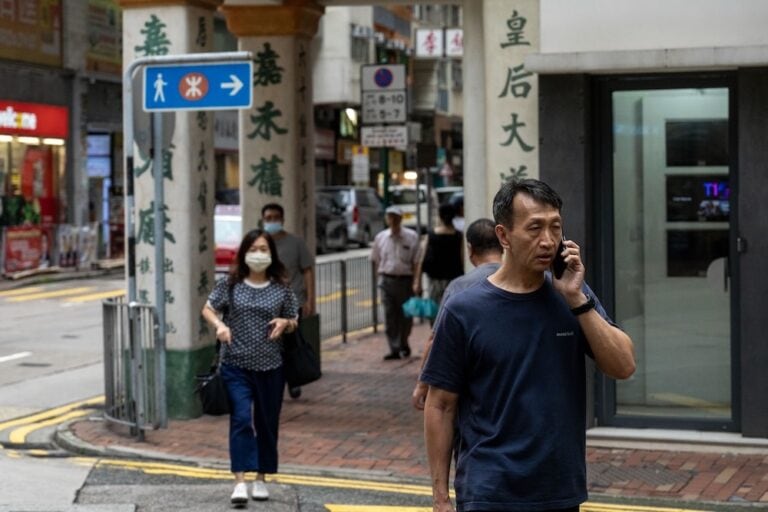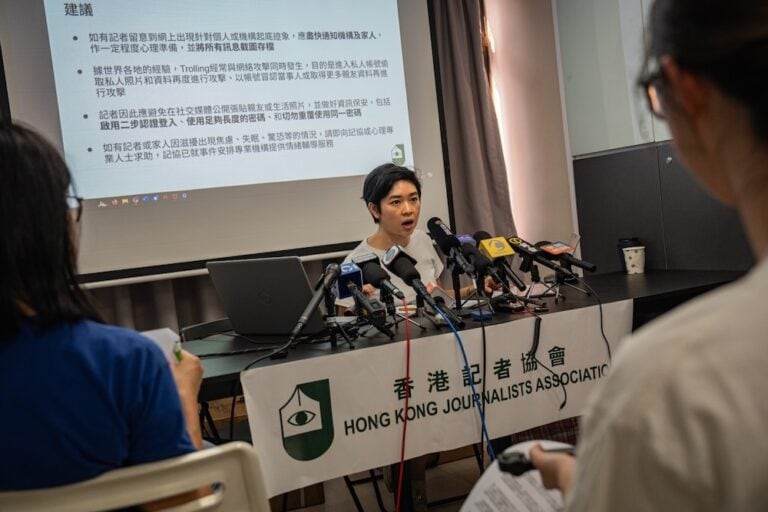The IFJ joins its affiliate the HKJA in condemning the continued use of violence against journalists covering the Occupy Movement protests in Hong Kong. We are also deeply concerned over the minimal support from the Hong Kong Government and Police for journalists and media workers covering the protests.
This article was originally published on ifj.org on 27 October 2014.
The International Federation of Journalists (IFJ) joins its affiliate the Hong Kong Journalists Association (HKJA) in condemning the continued use of violence against journalists covering the Occupy Movement protests in Hong Kong. We are also deeply concerned over the minimal support from the Hong Kong Government and Police for journalists and media workers covering the protests.
At least 24 journalists and numerous protesters have been attacked since the pro-democracy Occupy Central Movement began on September 22.
Most recently, five journalists were treated roughly by Anti-Occupy protesters on October 25. Three journalists from Hong Kong Television Broadcasting (TVB), a reporter with Hong Kong Radio Television of Hong Kong (RTHK), and an Al Jazeera journalist and her TV crew and were attacked at Tsim Sha Tsui when they were reporting on a rally organised by the Blue Ribbon Movement, which comprises three groups that support the Hong Kong police.
TVB’s Lui Chiu-Ho, John Sin and Poon Kwok-Fai were surrounded by dozens of anti-Occupy Movement protesters. They suffered verbal and physical abuse including being kicked and punched. Sin and Lui’s clothes were badly torn and they lost their glasses.
Lui said he was blocked and pulled from behind when he was trying to film a scuffle. When his camera fell, he grabbed his assailant and asked the police to prevent him leaving, but the police did not help. Lui said he was immediately surrounded and assaulted by up to 20 people.
“I put my hands up and remained silent, but people simply ignored my actions and kept kicking and punching my body, head and arms,” he said.
His colleagues Sin and Poon tried to escort Lui away from the scuffle, but they became targets themselves.
Sin said: “I actually don’t know why but we were surrounded by many people. Someone pulled my tie. My head, face and body were repeatedly punched and kicked.”
The three TVB journalists were taken to hospital for examination. Sin and Liu suffered multiple injuries. The anti-Occupy Movement protesters tried to take Lui’s camera, which was left on the ground. The protesters eventually handed over the camera after journalists from other media outlets, backed by the police, insisted on taking it back.
RTHK’s Wong Wing-yin was asked to prove she was a journalist when she was taking photos. Although Wong had already shown her press card, anti-Occupy Movement protesters ignored this and snatched away her press card and backpack. When she fell down, she was kicked on her leg and torso. She was eventually escorted to safety by foreign journalists.
An Al Jazeera journalist and her TV crew were also blocked and verbally assaulted by protesters when they were trying to film the protests.
The attacks sparked a public outcry. The RTHK Programme Staff Union launched a boycott of reporting on the Blue Ribbon Movement, which RTHK management supported. Management of Apple Daily and Digital Broadcasting Corporation Hong Kong Ltd (DBC) also announced they would refuse to report on Blue Ribbon Movement events.
The attacks and the people behind them were strongly condemned by six news unions and associations: the IFJ’s local affiliate, the Hong Kong Journalists Association (HKJA); the Independent Commentators Association; the Next Media Trade Union; the Ming Pao Staff Association; the Hong Kong Press Photographers Association; and Journalism Educators for Press Freedom
Shan Yee-lan, chairperson of the HKJA, said: “Since the beginning of the Occupy Movement, we have noted at least 24 cases of media workers being harassed, assaulted or prevented from reporting.”
The violent acts have trampled on press freedom and threatened journalists’ personal safety, she said.
The following day, the office of the Chief Executive, Leung Chun-Ying, released a brief statement condemning the violence. It said: “The Chief Executive and the Hong Kong Government all along respect press freedom and strongly condemn this savage act.”
But Leung did not answer media questions when he attended a public event the same day.
The IFJ Asia-Pacific Office said: “Press freedom is the cornerstone of a democratic society. Without it, people cannot exercise their basic rights. In order to ensure press freedom, it is crucial that journalists are able to work without fear. Since the Occupy Movement started, the Hong Kong police have been widely criticized by the public for being slow to deploy enough manpower to disperse scuffles immediately. As well, the police did not carry out their responsibility to protect people’s safety and did not arrest the attackers. Instead, they allowed them to leave the scene.”
We urge all Hong Kong Legislative Councillors to demand an investigation into the performance of the Hong Kong Police Department in response to the Occupy Movement, in order to defend press freedom in Hong Kong and protect journalists’ personal safety.



